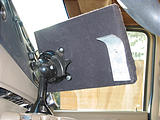geoffff
Observer
My friend has a sportsmobile that he takes to Mexico regularly (http://octopup.org/sportsmobile/). He's running a Fujitsu lifebook.
Here are some details on the Fujitsu touchscreen computer I have mounted in my Sportsmobile:
http://octopup.org/sportsmobile/computer-gps.htm
My mount is something I put together with a swivel mount I found at a surplus store, and some custom-bent steel & cloth:


So far I haven't had any hard drive problems with the Fujitsu, or with my older Toshiba Libretto solutions.
[edit: actually, that's a lie. Now that I think about it, I did have a hard drive gradually fail a year ago, but I clone my drive using http://www.apricorn.com/products.php?cat_id=52 so getting back up to speed again was quick.]
-- Geoff
Last edited:

